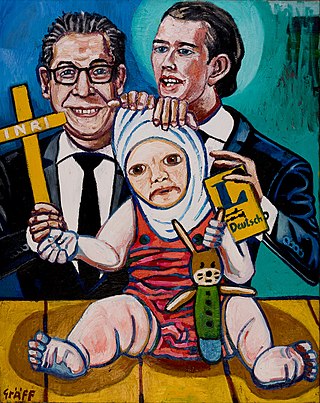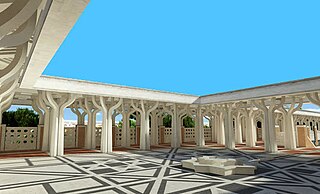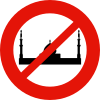Islamophobia is the irrational fear of, hostility towards, or hatred against the religion of Islam or Muslims in general. Islamophobia is primarily a form of religious or cultural bigotry; and people who harbour such sentiments often stereotype Muslims as a geopolitical threat or a source of terrorism. Muslims, with diverse ethnic and cultural backgrounds, are often inaccurately portrayed by Islamophobes as a single homogenous racial group.

Islam is a minority religion in France that is followed by around 3 million to 5.7 million people in France, which is around 4% to 10% of the nation's population.
The post-9/11 period is the time after the September 11 attacks, characterized by heightened suspicion of non-Americans in the United States, increased government efforts to address terrorism, and a more aggressive American foreign policy.
The Forum Against Islamophobia and Racism (FAIR) was a London-based Muslim advocacy and lobbying group which campaigns against discrimination in the form of Islamophobia and racism. It was established in 2001 as an independent charitable organization with the aim of monitoring media coverage of Islam and Muslims, and challenging examples of Islamophobia through dialogue with media organizations. It produced numerous publications relating to Islamophobia in the United Kingdom. Formed in 2000, Navid Akhtar and Samar Mashadi have been directors of FAIR.
The National Council of Canadian Muslims (NCCM) is a non-profit Canadian Muslim civil liberties and human rights advocacy organization. The organization was established in 2000 to focus on combatting Islamophobia, hate and racism through legal action, public advocacy, education, and media representation. NCCM's mission is "to protect Canadian human rights and civil liberties, challenge discrimination and Islamophobia, build mutual understanding, and advocate for the public concerns of Canadian Muslims."
The National Association of Muslim Police (NAMP) is a British organisation for Muslim police officers. It represents more than 2,000 members and was founded in 2007.

American Muslims often face Islamophobia and racialization due to stereotypes and generalizations ascribed to them. Due to this, Islamophobia is both a product of and a contributor to the United States' racial ideology, which is founded on socially constructed categories of profiled features, or how people seem.
Islamophobia in Australia is distrust and hostility towards Muslims, Islam, and those perceived as following the religion. This social aversion and bias is often facilitated and perpetuated in the media through the stereotyping of Muslims as violent and uncivilised. Various Australian politicians and political commentators have capitalised on these negative stereotypes and this has contributed to the marginalisation, discrimination and exclusion of the Muslim community.
Islamophobia in Canada refers to a set of discourses, behaviours and structures which express feelings of anxiety, fear, hostility and rejection towards Islam or Muslims in Canada.
Islamophobia in the United Kingdom refers to a set of discourses, behaviours and structures which express feelings of anxiety, fear, hostility and rejection towards Islam or Muslims in the United Kingdom. Islamophobia can manifest itself in a wide range of ways; including, discrimination in the workforce, negative coverage in the media, and violence against Muslims.

Cultural racism is a concept that has been applied to prejudices and discrimination based on cultural differences between ethnic or racial groups. This includes the idea that some cultures are superior to others or in more extreme cases that various cultures are fundamentally incompatible and should not co-exist in the same society or state. In this it differs from biological or scientific racism, which refers to prejudices and discrimination rooted in perceived biological differences between ethnic or racial groups.

Islamophobia in China refers to the set of discourses, behaviors and structures which express feelings of anxiety, fear, hostility and rejection towards Islam and/or Muslims in China.

WikiIslam is an anti-Muslim and anti-Islam wiki. The website was founded by Ali Sina in 2006. Registered users may modify and edit its content; in 2015, the website was acquired by the Ex-Muslims of North America and underwent a major revision in 2020.

Farid Hafez is an Austrian political scientist and holds the endowed chair of Class of 1955 Distinguished Visiting Professor of International Studies at Williams College and senior researcher at Georgetown University's The Bridge Initiative. Before his role at Williams College, he was at the department of political science and sociology at the University of Salzburg.
Allegations of Islamophobia in the UK Conservative Party have been made, including against senior politicians, such as Boris Johnson, Michael Gove and Zac Goldsmith. Baroness Warsi, former co-chair of the Conservative Party, said in 2018 that anti-Muslim prejudice had "poisoned" the party. Many Muslim party members welcomed Warsi's comments, saying that they felt the issue had been marginalised within the party.

Hijabophobia is a type of religious and cultural discrimination against Muslim women who wear the hijab. The discrimination has had manifestations in public, working and educational places.

Islamophobia is characterized by a hatred against the religion of Islam and those perceived to be following the religion, typically fueled by fear and hatred and sustained through the evolving stereotype of the Muslim identity. It has become increasingly common and widespread throughout the world, in particular since the September 11 attacks in the United States, however it existed in society before this. In Europe, there has been an increase in cultural tensions between national majorities and marginalized Muslim countries, as shown by the results of the 2009 elections in the European Parliament with a large vote toward anti-immigration. Within Italy, there is a large Islamic presence of approximately 1.25 million people, stemming from the widespread migration and settlement that began in the 1970s, in particular from North Africa. The Islamic population of Italy increasingly faces challenges when it comes to their position in society, with the increasing cultural hostility that stems from the growing presence of Islamophobia. Islamophobia has been present within Italy for many years; for example, in the 1920s, Muslims were not permitted to settle in the country due to their religion being viewed as "against common morality." The intensity of Islamophobia in Italy is enhanced by the historical religious structure of the state – which is heavily based on the Catholic Church.
Islamophobia in Poland is the fear, hatred of, or prejudice against the Islamic religion or Muslims in Poland. Since the Muslim community in Poland is small the situation has been described as "Islamophobia without Muslims". According to Monika Bobako, Islamophobia is one of the main elements of the Polish nationalist discourse. Islamophobia in Poland takes the form of xenophobia and discrimination towards Muslims or those perceived as Muslim.
The Collective Against Islamophobia in France was a French non-profit organisation, created in 2003 and dissolved in 2020, which mission was to combat discriminations towards Muslims in France, providing legal support to victims of such discriminations. It annually reported acts it considered Islamophobic. The organisation received critics, about its use of the term Islamophobia, and suspicion of having Islamist links.
Freedom of religion is recognized as a legal right in Hungary. The Fundamental Law of Hungary establishes the country as being founded on Christian values but guarantees the right to freedom of religion and freedom from religious discrimination. The history of religious freedom in Hungary has varied, with freedom of religion first recognized in 1919 before being restricted by Communist rule in the mid-20th century. Religious rights were restored following the end of Communism in Hungary, but the government under Viktor Orbán has been criticized for its restriction of religious freedoms.










